|
|
|
Sort Order |
|
|
|
Items / Page
|
|
|
|
|
|
|
| Srl | Item |
| 1 |
ID:
088474
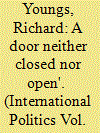

|
|
|
|
|
| Publication |
2009.
|
| Summary/Abstract |
Ukraine provides evidence of very different Common Foreign and Security Policy negotiating dynamics. In the run up to the country's Orange Revolution, significant differences persisted between member states over how the European Union (EU) should support Ukraine's democratic transition. A combination of normative entrapment and co-operative bargaining ensured that 'maximalist' and 'minimalist' member states united around a common position in support of the Orange Revolution. In subsequent debates over whether the EU should offer Ukraine a membership prospect, however, lowest common denominator dynamics prevailed. This case additionally demonstrates that both before and after Ukraine's democratic transition very specific external geostrategic factors played an important role in conditioning EU policy outcomes
|
|
|
|
|
|
|
|
|
|
|
|
|
|
|
|
| 2 |
ID:
105401
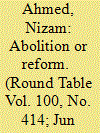

|
|
|
|
|
| Publication |
2011.
|
| Summary/Abstract |
This paper explores the characteristics, performance and pitfalls of the non-party caretaker government (NPCG) system that Bangladesh has developed to ensure foolproof parliamentary elections and an orderly succession of government. This system differs from the traditional system of the succession of government in a number of ways: first, none of the caretakers (members of NPCG) can be a member of the outgoing government; second, no caretaker can contest the elections; and third, none can also be a member of any political party. The NPCG can undertake only election-related activities; it is not authorised to take any major policy decision. The article examines the context within which the successive caretaker governments (since 1991) have worked and compares and contrasts their performance. It shows that although initially appreciated for its unique contribution to the transition to democracy from authoritarianism, and particularly to the orderly succession of government, the NPCG system has recently been attacked and seemingly rejected by those who were instrumental in its creation-party politicians. This paper explores the logic and politics underlying the shift in party attitude towards the NPCG system, arguing that the latter probably outweighs the former. It suggests that the system needs reform, not abolition.
|
|
|
|
|
|
|
|
|
|
|
|
|
|
|
|
| 3 |
ID:
117537
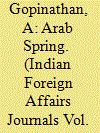

|
|
|
| 4 |
ID:
123507
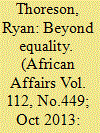

|
|
|
|
|
| Publication |
2013.
|
| Summary/Abstract |
In the decade after apartheid, South Africa became well-known for the unprecedented rights and recognition it afforded to lesbian, gay, and bisexual persons. This article explores the legal and social battles fought by South Africa's trans and intersex activists in the aftermath of the democratic transition, and the ways in which they are meaningfully distinct from the conventional narrative of the post-apartheid LGB movement. In particular, I highlight three areas of divergence - an emphasis on regional advocacy, a focus on micropolitics, and a facility with multiple discourses - that have been central to trans and intersex advocacy. These features of trans and intersex struggles caution against any generalizations about sexuality and law in South Africa. As the twentieth anniversary of the democratic transition approaches, the counternarrative of trans and intersex advocacy merits closer attention as a model for organizing, agitating, and building a movement in contemporary South African politics.
|
|
|
|
|
|
|
|
|
|
|
|
|
|
|
|
| 5 |
ID:
125599
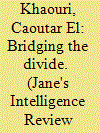

|
|
|
|
|
| Publication |
2013.
|
| Summary/Abstract |
The Islamist secular divide in Tusia has deepended in the midst of the deteriorating security situation, affecting democracy. Caoutar El Khaouri examines the likely outcome of the political crisis and the threat coming from Islamist -derived terrorisms
|
|
|
|
|
|
|
|
|
|
|
|
|
|
|
|
| 6 |
ID:
134309
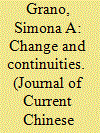

|
|
|
|
|
| Summary/Abstract |
In representative governments, a healthy turnover of power among ruling parties is viewed as a critical sign of democratic principles. In a political environment where voters’ opinion is the key political driver, the greatest challenge facing the NGO community is often that environmental concerns only represent secondary aspects of the policy-making process. This article focuses on the transformations (or lack thereof) in Taiwan’s environmental governance, under different political parties, particularly during the past few years. I begin with an overview of the key issues that have characterised Taiwan’s environmental movement and its battles, starting with the democratic transition of the mid-1980s, before focusing on two developmental projects – Taiwan’s eighth petrochemical plant and fourth nuclear power facility – to bring to light the most significant changes and continuities in the environmental-policy realm. I pay special attention to the post-2008 period and the ensuing renaissance experienced by the environmental movement, among others. The final section considers the consequences of the KMT’s second elect-oral victory – in January 2012 – for environmental policies and, in light of the article’s findings, summarises what has changed and what has consistently remained the same under different ruling parties.
|
|
|
|
|
|
|
|
|
|
|
|
|
|
|
|
| 7 |
ID:
127787
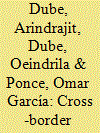

|
|
|
|
|
| Publication |
2013.
|
| Summary/Abstract |
To what extent, and under what conditions, does access to arms fuel violent crime? To answer this question, we exploit a unique natural experiment: the 2004 expiration of the U.S. Federal Assault Weapons Ban exerted a spillover on gun supply in Mexican municipios near Texas, Arizona, and New Mexico, but not near California, which retained a pre-existing state-level ban. We find first that Mexican municipios located closer to the non-California border states experienced differential increases in homicides, gun-related homicides, and crime gun seizures after 2004. Second, the magnitude of this effect is contingent on political factors related to Mexico's democratic transition. Killings increased disproportionately in municipios where local elections had become more competitive prior to 2004, with the largest differentials emerging in high narco-trafficking areas. Our findings suggest that competition undermined informal agreements between drug cartels and entrenched local governments, highlighting the role of political conditions in mediating the gun-crime relationship.
|
|
|
|
|
|
|
|
|
|
|
|
|
|
|
|
| 8 |
ID:
102165
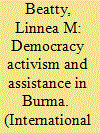

|
|
|
| 9 |
ID:
132895
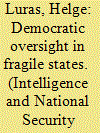

|
|
|
|
|
| Publication |
2014.
|
| Summary/Abstract |
In most transition countries the main aim of 'democratizing intelligence' is to weaken the authoritarian governmental structures by introducing more transparency, legality and oversight. In Bosnia and Herzegovina however, the state-building efforts driven by international parties combined formal democratization processes such as independent oversight with the strengthening and operational capacity building of previously weak-to-non-existent intelligence structures. In parallel with the descent into war when Yugoslavia collapsed in the early 1990s, the State Security Service (SDB) in the Republic of Bosnia had split into three ethnically-based outfits answering to the political and military leaders of war. 'Democratization' of intelligence in Bosnia and Herzegovina since the establishment of a unified, state-level Intelligence and Security Agency (OSA) in 2004 has followed its own unique path reflecting the fragmented nature of politics in Bosnia and the leading role of international organizations in proposing and effectuating institutional reforms. Nevertheless, in terms of habits, operational methods and values many Bosnian intelligence officers went through similar adaptations and transitions as their colleagues in countries where institutions at the time of democratic transition were too strong and authoritarian rather than, as in the case of Bosnia, being deemed too weak and ineffectual.
|
|
|
|
|
|
|
|
|
|
|
|
|
|
|
|
| 10 |
ID:
113387
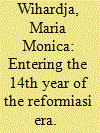

|
|
|
| 11 |
ID:
093618
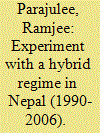

|
|
|
| 12 |
ID:
119558
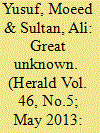

|
|
|
| 13 |
ID:
186516
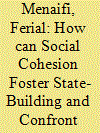

|
|
|
| 14 |
ID:
169822
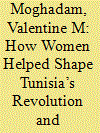

|
|
|
|
|
| Summary/Abstract |
“Women, and women’s rights, were at the center—not the margins—of Tunisia’s revolution.”
|
|
|
|
|
|
|
|
|
|
|
|
|
|
|
|
| 15 |
ID:
101331
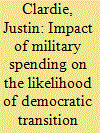

|
|
|
|
|
| Publication |
2011.
|
| Summary/Abstract |
Many countries complete tenuous transitions to democracy and must work to prevent an authoritarian reversal, which is often at the hands of the military. One of the most important tools the new government has in dealing with the military is the amount of money allocated to the military. This leads to the question, how does government military spending in post-transition democratic countries affect the chances of democratic transition failure? The extant literature provides two answers. The first is to increase military spending to placate the military; the second is to decrease military spending to weaken the military and address social welfare needs. The article tests these two hypotheses by examining democratic transitions from 1967 to 1999 using both logit and survival analysis methods. The results of the study provide robust support for the hypothesis that decreasing military spending decreases the likelihood of a democratic transition failure.
|
|
|
|
|
|
|
|
|
|
|
|
|
|
|
|
| 16 |
ID:
082783
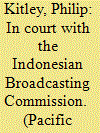

|
|
|
|
|
| Publication |
2008.
|
| Summary/Abstract |
President Soeharto's resignation on May 1998 came as a result of intense dissatisfaction with his management of the economy and public dissatisfaction with rent-seeking activities of his family and cronies. The resignation ushered in a heady period of reformasi or reform, marked by a euphoric return to democratic national elections in 1999 and legislation which sought to write reform into national politics and governance. The Press Act of 23 September 1999, electoral reform, the abolition of the Department of Information and the creation of new independent watchdog bodies were part of a process which placed the rule of law and accountability to the public centre stage in Indonesia. In the five years since the 1999 national elections, however, conservative political and cultural forces have resorted to litigation and law and order rhetoric to slow down and even reverse the reform agenda. In this article the process of reform resistance through legal deadweighting is documented and explored in an examination of an excessive resort to judicial remedies brought against the work of the Indonesian Broadcasting Commission in its first period of office.
|
|
|
|
|
|
|
|
|
|
|
|
|
|
|
|
| 17 |
ID:
109149
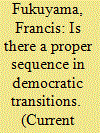

|
|
|
| 18 |
ID:
077207
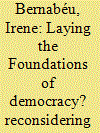

|
|
|
|
|
| Publication |
2007.
|
| Summary/Abstract |
This article explores the relationship between security sector reform (SSR) and democratic transition in post-conflict contexts, drawing on Kosovo as a case. The study focuses in particular on the justice sector in Kosovo, reviewing the ways in which security, the rule of law and democracy have been intertwined. The article first outlines the context of the international mission in Kosovo, before proceeding to consider how the objectives, needs and constraints of different actors have influenced the reform of the security institutions and the democratization process. Thereafter, it discusses the concepts of SSR and democratic transition, briefly reviewing the UN discourse and record in SSR-related activities. Finally, it explores the interplay of these factors in the Kosovo justice sector reform process. The main finding stemming from this analysis is that not only do SSR and democratization agendas interfere with each other, but measures adopted to cope with security challenges related to the post-conflict context can also affect them both. Furthermore, this finding demonstrates that a well-developed UN theoretical discourse is still not matched by the reality of UN practices in the field
|
|
|
|
|
|
|
|
|
|
|
|
|
|
|
|
| 19 |
ID:
108587
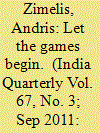

|
|
|
|
|
| Publication |
2011.
|
| Summary/Abstract |
This article discusses the political role of the Olympic Games and its implications on the hosting country's political and social life by analysing two cases-South Korea (1988) and Mexico (1968). Contrary to the belief that the games were created as an event that transcends politics, this study concludes that Olympic Games have been and are used as a political tool for various purposes and specific political circumstances eventually influenced the selection of Mexico's and South Korea's priorities for national development. Moreover, the findings of this article demonstrate that the Olympic Games served as a catalyst accelerating democratic changes in South Korea, and this finding can be applied to heuristic analysis of the future Olympic Games.
|
|
|
|
|
|
|
|
|
|
|
|
|
|
|
|
| 20 |
ID:
131378
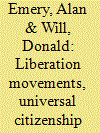

|
|
|
|
|
| Publication |
2014.
|
| Summary/Abstract |
How does a national liberation movement address the security fears of the Other to promote a democratic transition? We consider South Africa and Israel-Palestine apt cases for comparison as the intractability of each conflict derives in large part from a colonial settlement process that led to the creation of ethno-nationalist states. Similarly the manner in which the liberation movements have defined themselves and the Other accounts in part for the successful transition in South Africa and the lack thereof in Israel-Palestine. In the Palestinian case collective intra-movement struggles framing the post-liberation state in exclusive terms have reinforced a predilection by Israelis to fight, leading to an ongoing stalemate and violence; in the South African case framing the post-liberation state in inclusive terms initiated a cycle of movement-Other concessions and democratisation. Our study suggests that universalistic democratic principles codified in public charter will function as a 'master frame' applicable to divided society struggles.
|
|
|
|
|
|
|
|
|
|
|
|
|
|
|
|
|
|
|
|
|